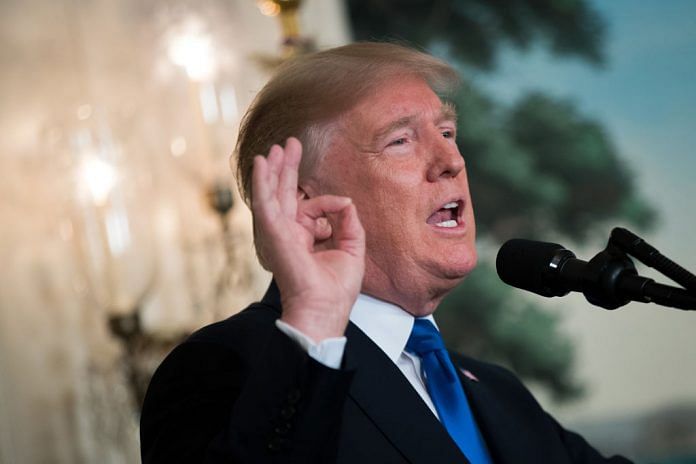Five years ago, it would’ve been unimaginable to live in a world with a truly patriotic Iran and a deeply autocratic Poland. But that’s what the new world order, where nothing can be predicted anymore, seems to look like.
Trump made Iran great again
Among the many gaffes of Trump’s presidency could be making Iranians a patriotic lot, writes Thomas Erdbrink in The New York Times.
“After years of cynicism, sneering or simply tuning out all things political, Iran’s urban middle classes have been swept up in a wave of nationalist fervor.
The changing attitude, while some years in the making, can be attributed to two related factors: the election of President Trump and the growing competition with Saudi Arabia, Iran’s sectarian rival, for regional dominance.”
“The seeds of the new nationalism were planted with the election of the moderate Hassan Rouhani as president in 2013. It was the first glimmer of hope for Iran’s urban middle classes since the brutal crackdown on street protests following the 2009 presidential election, widely seen as rigged.”
“Then came the Trump administration, and its singular focus on Iran as the source, as the defense secretary, Jim Mattis, has said on numerous occasions, of all the troubles in the Middle East.”
“In short, it appears that Mr. Trump and the Saudis have helped the government achieve what years of repression could never accomplish: widespread public support for the hard-line view that the United States and Riyadh cannot be trusted and that Iran is now a strong and capable state capable of staring down its enemies.”
The forward march of Poland’s autocrat
Look at Poland, and you see “the picture of an aspiring autocrat moving fast to make the most of a short window of opportunity in which political and economic circumstances are lined up in his favor,” writes Maciej Kisilowski in Politico.
It’s not just the massive Independence Day march in Warsaw that’s symptomatic of the autocracy taking root in Poland. “Other policies pushed forward by the ruling Law and Justice party (PiS) have incited a similar mix of outrage and bewilderment. Why does Kaczyński (the de facto leader of Poland) not appear to worry that the judiciary he captured may one day be used against his own party? Is he not afraid that antagonizing Germany, a key NATO and EU ally, may eventually help Russian President Vladimir Putin? Is he not uneasy about increasing Poland’s economic vulnerability by lowering the retirement age and introducing massive new welfare spending?
Unfortunately, Kaczyński’s aggressive short-termism is perfectly rational — if he intends to do away with Poland’s democracy altogether.”
“The ruling party seems dead set on building a state apparatus willing to do whatever it takes to protect the regime. And it can do so in large part because of its popularity, which exceeds 45 percent in recent opinion polls.”
Putin’s palatable political opposition
No, Putin’s political opponents in Russia may not be an oxymoron, after all. “Vladimir Putin’s Kremlin might maintain a strong grip on Russia, but since a Sept. 10 election, the ancient fortress on the Moscow River has been surrounded by the opposition,” writes Leonid Ragozin in Bloomberg. But this might just be the kind of opposition Putin won’t mind.
“Anti-Putin liberals have filled local councils in the Russian capital’s historic and commercial core, as well as a few upmarket residential areas—attaining majorities in 17 of the city’s 125 municipal districts. In some others, the opposition now has sizable minorities. While these councils have only the slightest power to effect change, on par with a New York City community board at best, the symbolism is what really matters to the election’s victors.”
“This envelopment of the Kremlin by political enemies may also serve Putin’s purposes—keeping activists focused on broken elevators and potholes instead of publicizing corruption or seeking higher office.”
“As optimistic as these local politicians may be, the rest of the country is a different story. Moscow’s moderate political climate contrasts with more conservative, pro-Putin sentiment elsewhere. Gallyamov, the expert on Russian politics, said Putin tolerates his Moscow opponents in the same way China tolerates dissent in Hong Kong. The thinking is that, out in the suburbs and beyond, the Kremlin doesn’t really have anything to worry about.”
The attempts to defame liberal media in the US may have just become a tad bit cheaper. An organisation out there to trap “liberal” journalists in stings to destroy their credibility approached The Washington Post through a woman claiming to be a Roy Moore victim.
Throwing a weak punch
Terrorism could’ve been easily combatted if angry television speech promising “brute force,” a showy bombing raid, and attacks on media reporting sufficed. While the regime of Abdel Fatah al-Sissi in Egypt has done all of that since 300 worshippers lost their lives in the bloodiest assault yet in Egypt, its obvious that this “familiar incompetence” simply won’t do, editorialises The Washington Post.
“Even when reported from a distance, the Sissi regime offers a textbook example of how not to respond to Islamist extremism. The army patrols Sinai in tanks and armored personnel carriers; rather than protecting the population, it is known for summary executions, torture and wanton destruction of civilian infrastructure. In Cairo, the regime has used terrorism as a pretext for the most severe political repression in Egypt’s modern history. Tens of thousands of political activists, including prominent secular and liberal figures, have been imprisoned, independent civil society stifled and the media silenced.”
As usual, Trumps interventions doesn’t quite help. “Though his administration was compelled by law to cut some aid to Egypt several months ago, Mr. Trump remains a fan of Mr. Sissi. He called the strongman after the Sinai attack and tweeted, inexplicably, that it showed the need for ‘the WALL’ and ‘the BAN’. When it comes to preventing the growth of the Islamic State in Egypt, Mr. Trump and Mr. Sissi are partners in obtuseness.”



